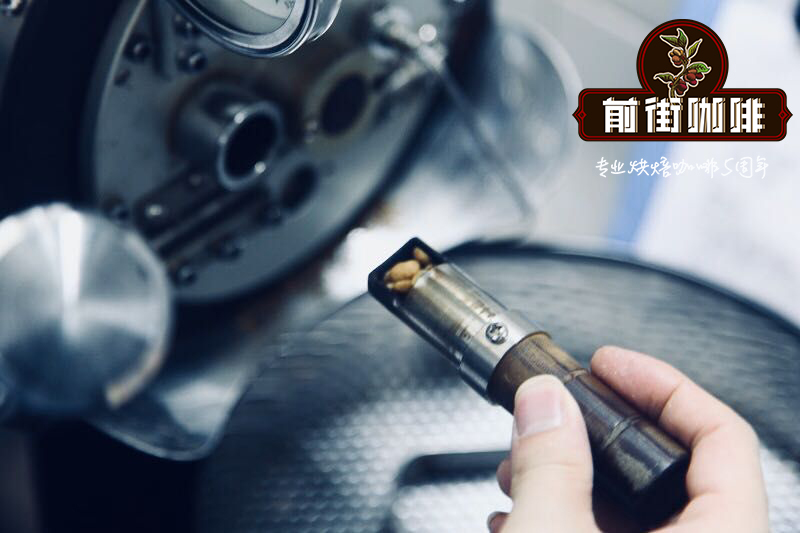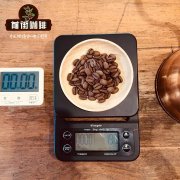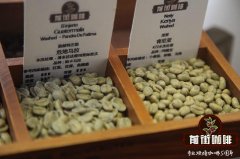What is the aroma and flavor of Rwandan coffee _ how to roast Rwandan coffee beans?

Professional coffee knowledge exchange more coffee bean information please follow the coffee workshop (Wechat official account cafe_style)
Rwanda: this small East African country should not be ignored by roasters and coffee lovers. It is known as the hometown of thousands of mountains, and its high-quality, high-altitude coffee coexists with its poverty.
It is not the largest coffee producer in Africa; in 2016, it harvested only 220000 bags of coffee (60 kg), compared with 7.1 million in Ethiopia and 4.9 million in Uganda. But Rwanda is positioning itself as a world-class producer of boutique coffee.
Rwanda coffee processing plant
But what should roasters know about Rwandan coffee? What is the smell and aroma of it? How did it come about? What kind of baking style does it have?
● Coffee is a Hope
Coffee was not grown in Rwanda before. Coffee was introduced into the country by German missionaries around the beginning of the 20th century. Since then, coffee has been a source of income for many rural families.
However, no record in the history of Rwanda can ignore the tragedy of the 1994 Rwandan Holocaust, when 800000 people were killed and as many as 250000 women were raped in just 100 days. After the tragedy, various guild organizations such as the Partnership for Enhancing Agriculture in Rwanda through Linkages (PEARL), Sustainable Partnerships to Enhance Rural Enterprises and Agricultural Development (SPREAD) PEARL and SPREAD were funded by the United States Agency for International Development (USAID) to support the reconstruction of agriculture in Rwanda.
As one of the most valuable crops in the country, coffee is one of the focuses of agricultural reconstruction plans. The impact of investment in infrastructure and training for coffee producers still exists today.
Dan Clay (right), global program director for MSU sustainable agri-food systems, and Angelo Oclicho (center), CEO and chief roaster of Paramount Coffee Company in Lansing, Michigan. Check the dried coffee beans at the coffee processing station.
Nevertheless, Rwanda still faces many problems: for example, about 40 per cent of the population lives in poverty. However, as of 2016, coffee was Rwanda's fourth largest export, with an annual export value of US $59.4 million. The development of the coffee industry can continue to help the country's economic recovery.
Rwanda's National Agricultural Export Development Agency (NAEB) said its coffee strategy was to "position Rwanda as a boutique coffee producer" to "enable the coffee industry to better promote the country's development and prosperity." It noted that the price increase was a sign of its success and focused on improving production and processing measures.
● Rwanda Coffee processing, production and Flavor
Most love Rwandan coffee because of its syrup and mellow taste, which is sweet and full-bodied, thanks in part to the variety of coffee: most Rwandan coffee beans are either Bourbon or Bourbon branches.
However, in Rwanda you will find various flavors of coffee: cherries, grapes, lemons, chocolates, melons, oranges, nectarines, candy, apricots, plums, and so on. In addition to the clean, refreshing, sour taste of citrus, jujube is also one of the special flavors of Rwandan coffee.
These fruity flavors are characterized by the good growing environment of the country. In Rwanda, there are about 400000 smallholder producers (NAEB), and most farms are 1700-2000 above sea level. High altitude increases the complexity of coffee flavor (so higher temperature and RoR are needed during baking)
Most of the coffee in this country comes from the south and west, but there are actually five different places of origin. In the northwest, there is the Virunga producing area of the volcanic belt (this is the home of the famous Silverback Silverback gorilla). In the west, the Kivu producing area is located next to Lake Kivu. There are Kizi Rift producing areas in the middle. Further south is Akagera, the producing area, at a relatively low altitude (1300). Last but not least are the Muhazi producing areas in the east.
Of course, all these coffee areas are different. However, volcanic soils with high elevations and rich in nitrogen are generally found in the producing areas of the country. These create excellent conditions for the production of high quality coffee beans.
● fully washed Coffee (fully washed processing)
In the past, coffee in Rwanda was handled by independent farmers, whose quality was unstable and then mixed with coffee processed by neighboring farms. However, in the wake of the genocidal upheaval, both the Government and PEARL agencies encouraged producers to invest in full washing processes. There are now 245 processing stations in the country.
It is worth mentioning that the whole water washing treatment, also known as double washing (double washed), is usually treated in a slightly different way than the water washing treatment washed. Coffee is usually soaked twice, which is common in Africa but not in Latin America. Of course, if you work hard enough, you will also find other ways to deal with it. However, the flavor of typical Rwandan coffee is high sweet, mellow and full-bodied.
(editor's note: wet fermentation is sometimes called "double washing" double washed, "double fermentation" double fermented, "Kenyan water washing", and so on. This treatment is common in East Africa and can improve purity. After removing the skin and pulp of the coffee, soak the coffee with parchment in water, which can prolong the fermentation time and produce a soft mellow thickness, complex acidity, and more subtle flavor. Different temperature and water quality will become important influencing factors. We still need to explore and learn more about the effects of different water quality on coffee fermentation.
What are the challenges facing ● Rwanda Coffee?
The coffee industry in Rwanda is now stronger than ever, but it still faces challenges. The biggest problem is the "potato-like flavor flaw", which affects the quality of coffee in Rwanda and Burundi. Potato-like flavor defects are caused by an ant bug that absorbs nutrients from cherries. Small holes caused by ants are difficult to detect during harvest, but the resulting smell of raw potatoes will be noticed in cup tests.
In addition, coffee growers and producers in Rwanda face challenges around the world: climate change, reduced land suitable for coffee cultivation, and low prices. However, the coffee industry in Rwanda continues to develop, with a focus on quality and processing.
How does ● bake Rwandan coffee
Let's take a look at the delicacy of Rwandan coffee and how they are produced.
Like all coffee, roasting is affected by the variety, origin, processing methods and other factors of coffee beans. However, there is one thing you should remember: because of the altitude of Rwandan coffee, its density is high.
A common rule of African boutique coffee is to apply a large amount of calories during roasting. Hard beans like this can transfer heat well, so a higher lower bean temperature and a higher heating rate will be better.
At the same time, the alcohol thickness of Rwandan coffee is very good, so you can also try to extend the flavor development period Development time and burst period to emphasize alcohol thickness. Lightly roasted Rwandan coffee is sour and pleasant, but don't be afraid to create more syrup-like thickness / taste in the coffee.
Qianjie coffee: Guangzhou bakery, the store is small but a variety of beans, you can find a variety of unknown beans, but also provide online store services. Https://shop104210103.taobao.com
Important Notice :
前街咖啡 FrontStreet Coffee has moved to new addredd:
FrontStreet Coffee Address: 315,Donghua East Road,GuangZhou
Tel:020 38364473
- Prev

Description of the flavor of Rwandan coffee beans-is Rwandan coffee good? what are the characteristics of Rwandan coffee?
For more information on coffee beans, please follow the Coffee Workshop (Wechat official account cafe_style) Rwanda is a landlocked country located in the southern equator of central Africa, bordered by Tanzania to the east, Burundi to the south, the Democratic Republic of the Congo to the west and Uganda to the north. The territory is mountainous, known as the country of a thousand hills. The divide between the Congo River and the Nile River runs through Lu from north to south.
- Next

The reason why Rwandan coffee can be selected by Starbucks. The significance of coffee to Rwanda
Professional coffee knowledge exchange more coffee bean information please follow the coffee workshop (Wechat official account cafe_style) what kind of coffee beans can become Starbucks coffee beans? It may be due to special geographical conditions, or it may be due to the cooperation of coffee farmers. Rwandan coffee is the representative of the latter, and local women choose carefully from the first step of planting.
Related
- Detailed explanation of Jadeite planting Land in Panamanian Jadeite Manor introduction to the grading system of Jadeite competitive bidding, Red bid, Green bid and Rose Summer
- Story of Coffee planting in Brenka region of Costa Rica Stonehenge Manor anaerobic heavy honey treatment of flavor mouth
- What's on the barrel of Blue Mountain Coffee beans?
- Can American coffee also pull flowers? How to use hot American style to pull out a good-looking pattern?
- Can you make a cold extract with coffee beans? What is the right proportion for cold-extracted coffee formula?
- Indonesian PWN Gold Mandrine Coffee Origin Features Flavor How to Chong? Mandolin coffee is American.
- A brief introduction to the flavor characteristics of Brazilian yellow bourbon coffee beans
- What is the effect of different water quality on the flavor of cold-extracted coffee? What kind of water is best for brewing coffee?
- Why do you think of Rose Summer whenever you mention Panamanian coffee?
- Introduction to the characteristics of authentic blue mountain coffee bean producing areas? What is the CIB Coffee Authority in Jamaica?

